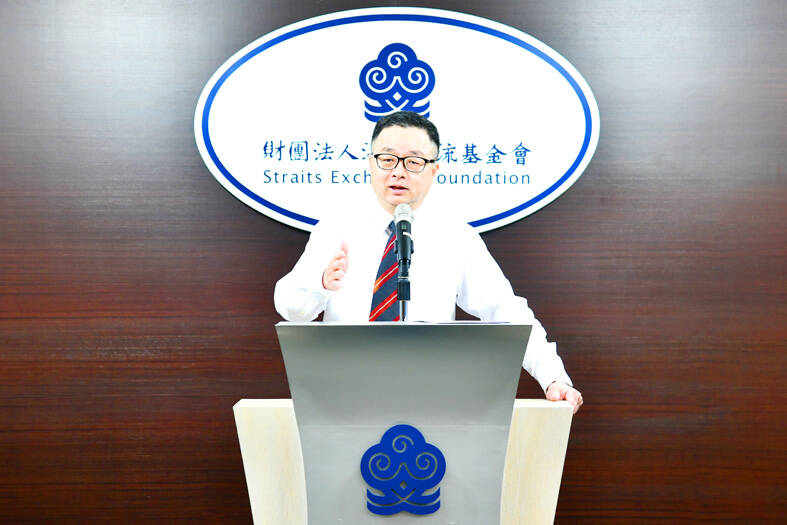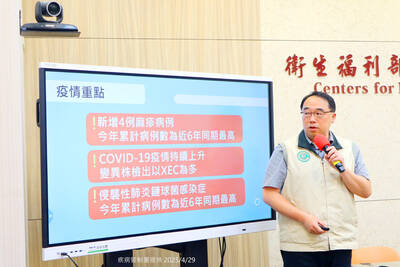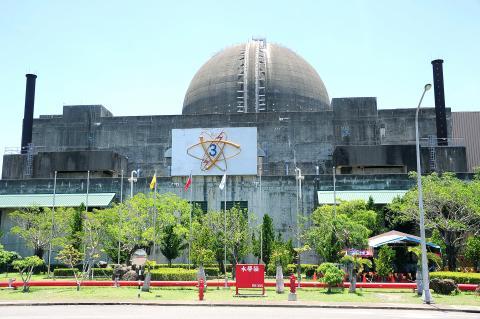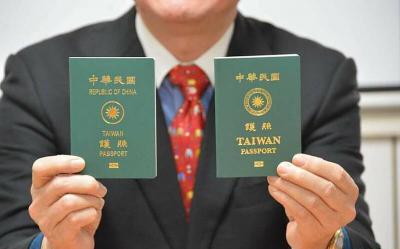More than 25 percent of China-based Taiwanese businesses are considering terminating their operations in China, with 50 percent looking to increase investments into non-Chinese supply chains, given the US’ tariffs, Straits Exchange Foundation (SEF) Secretary-General Luo Wen-jia (羅文嘉) said on Friday.
US President Donald Trump on April 2 imposed a 32 percent tariff on imports from Taiwan, but one week later announced a 90-day pause on its implementation. However, a universal 10 percent tariff was immediately applied to most imports from around the world.
On April 12, the Trump administration exempted computers, smartphones and semiconductors from the new tariffs.

Photo courtesy of the Straits Exchange Foundation
Taiwanese businesses most affected by the situation are those with operations in China that primarily export their products to the US and have low gross profit margins, Luo said.
Companies that cater to China’s domestic market are the second-most affected, Luo added.
US tariffs have significantly affected the imports of materials and components for China’s domestic markets. As a result, products that were previously stored are now being sold domestically, increasing competition, he said.
Although electronics, information technology (IT) products and semiconductors are less affected, the Mainland Affairs Council urged business owners to wait and see how the Chinese market reacts, Luo said.
The consensus among Taiwanese businesses in response to the short-term uncertainty brought about by US tariff policies is to increase investment in non-Chinese supply chains, and bolster the resilience of regional supply chains to weather the effects of the changes in the international economic order and geopolitical shifts, Luo said.
The SEF also reminded Taiwanese businesses to be careful of investment risks, he said.
Meanwhile, in view of the coming summer break for students, Luo said that travelers to China should be wary of youth start-up assistance groups and youth culture interaction groups.
They could be a cover for scam groups, he said, citing as an example an incident in which the Chinese Youth Entrepreneurs Association used identification documents from tour group members to apply for loans for Sichuan’s youth start-up zone, he said.
Culture interactive groups could be a front for cheap tour groups or groups that focus on political propaganda and “united front” rhetoric, Luo said.
The number of people who are missing due to those reasons varies, but even one missing person shows that there is a risk of “disappearing” when traveling to China, he said.
The SEF would publicize those cases while maintaining the anonymity of the people affected to promote greater awareness of the risks associated with traveling to China, he added.

A fugitive in a suspected cosmetic surgery fraud case today returned to Taiwan from Canada, after being wanted for six years. Internet celebrity Su Chen-tuan (蘇陳端), known as Lady Nai Nai (貴婦奈奈), and her former boyfriend, plastic surgeon Paul Huang (黃博健), allegedly defrauded clients and friends of about NT$1 billion (US$30.66 million). Su was put on a wanted list in 2019 when she lived in Toronto, Canada, after failing to respond to subpoenas and arrest warrants from the Taipei District Prosecutors’ Office. Su arrived at Taiwan Taoyuan International Airport at 5am today on an EVA Air flight accompanied by a

COVID-19 infections have climbed for three consecutive weeks and are likely to reach another peak between next month and June, the Centers for Disease Control (CDC) said yesterday. Weekly hospital visits for the disease increased by 19 percent from the previous week, CDC Epidemic Intelligence Center Director Guo Hung-wei (郭宏偉) said. From Tuesday last week to yesterday, 21 cases of severe COVID-19 and seven deaths were confirmed, and from Sept. 1 last year to yesterday, there were 600 cases and 129 deaths, he said. From Oct. 1 last year to yesterday, 95.9 percent of the severe cases and 96.7 percent of the deaths

Restarting the No. 2 reactor at the Ma-anshan Nuclear Power Plant would take up to 18 months, Minister of Economic Affairs J.W. Kuo (郭智輝) said today. Kuo was answering questions during a meeting of the Legislative Yuan’s Economics Committee, where legislators are considering amendments to the Renewable Energy Development Act (再生能源發展條) amid concerns about the consequences of the Pingtung County reactor’s decommissioning scheduled for May 17. Its decommissioning is to mark the end of Taiwan’s nuclear power production. However, Chinese Nationalist Party (KMT) lawmakers have proposed an amendment to the Nuclear Reactor Facilities Regulation Act (核子反應器設施管制法) that would extend the life of existing

The Ministry of Foreign Affairs yesterday demanded that Somalia reverse its decision prohibiting Taiwanese passport holders from entering or transiting through the country. Somalia said it is following the “one China” principle based on UN Resolution 2758. The ministry said that Somalia is misinterpreting the resolution under China’s instigation, creating a false impression that Taiwan is subordinate to China. The Somali Civil Aviation Authority told airlines on Tuesday last week that starting today, any passengers with passports or travel documents issued from Taiwan or its affiliated institutions would not be allowed to enter or transit through Somalia. The decision comes as Taiwan is boosting